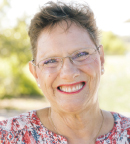
Donna Fernandez. ©Kelsey Foster
Despite the fact that my father was a smoker and I watched him die a horrible death from lung cancer in the 1970s, until 4 years before my own lung cancer diagnosis in 2012, I, too, was a heavy smoker for most of my adult life. Still, cancer was the farthest thing from my mind when I made an appointment with a primary care physician, because I had been gaining weight and was convinced that the problem was a sluggish thyroid.
The physician noted my smoking history and gave me a careful physical exam; when she noticed a tiny nodule on the right side of my collarbone, she said she wanted me to have a computed tomography (CT) scan that day. When she called a couple of days later to tell me that the test showed “some activity” in my lungs and my supraclavicular lymph nodes, she also urged me to have a positron-emission tomography (PET) scan as soon as possible. I remember thinking, she must be worried that I have cancer, but I was still thinking the problem was with my thyroid. Maybe I was just in denial, because the thought of cancer, especially lung cancer, was so terrifying to me.
Living With a Death Sentence
ALTHOUGH I DIDN’T know it at the time, after receiving the results of my PET scan, which showed tumors in both lungs and one in my supraclavicular lymph node, my doctor sent the results to several oncologists for a second opinion. When she called to give me the news that I had lung cancer, she also said she had made an appointment for me with one of the oncologists for the next day. The oncologist explained that I had stage IV non–small cell lung cancer (NSCLC) adenocarcinoma and that because radiation and surgery were not treatment options for me, my only recourse was chemotherapy. In any case, he told my husband that I had about 4 months to live.
Saving Lives Through Research
THE THOUGHT OF chemotherapy scared me because I remembered how it had ravaged my father and failed to prevent progression of his lung cancer. But with no other option, I agreed to a course of a combination regimen of carboplatin, pemetrexed (Alimta), and bevacizumab (Avastin). Initially, the chemotherapy worked in shrinking my tumors, but once the therapy ended, the tumors grew back with a vengeance.
Next, my oncologist recommended either a course of docetaxel, which he said would have harsher side effects than my previous chemotherapy and was even less likely to be effective in controlling the spread of the cancer, or enrollment into a clinical trial for the programmed cell death protein 1 checkpoint inhibitor nivolumab (Opdivo).
To be honest, I didn’t think the trial would benefit me, but I hoped the knowledge gained from the study would help future patients with advanced NSCLC and save lives. Almost immediately, the tumors in my lungs and collarbone started to shrink, and they remained stable for 5 years. In 2017, the tumor in the supraclavicular lymph node began to grow, and it was successfully obliterated with radiation therapy.
Recently, my oncologist reduced the frequency of nivolumab from every 2 weeks to monthly, and I’ll remain on the treatment until my cancer progresses. So far, the tumors in my lungs continue to be stable, and, thankfully, the cancer hasn’t spread further.
“I’m especially appreciative of the loving care I receive from my oncologist and my nurses. I actually look forward to clinic day because I know I’ll be with friends and so have less fear.”— Donna Fernandez
Tweet this quote
Looking Forward to the Future
EXCEPT ON THE day I go for my monthly treatment, I don’t think about having cancer, and the disease hasn’t changed my ability to live a full and happy life. In fact, receiving a cancer diagnosis has benefited my life in ways I couldn’t have imagined. I’ve become active in patient advocacy, attend oncology conferences to stay current on advances in lung cancer, and participate in a variety of online patient forums. The connections I’ve made have been life-altering.
Of course, I wish I didn’t have cancer but feel blessed to have met lung cancer survivors from all walks of life. I cherish their friendship and support and am grateful to be able to give back to the survivorship community that has given me so much. I’m especially appreciative of the loving care I receive from my oncologist and my nurses. I actually look forward to clinic day because I know I’ll be with friends and so I have less fear.
When I was first diagnosed, I rejoiced in the beauty of everyday life, literally stopping to smell the roses at every opportunity. But as time has gone on, I’ve become more complacent. It’s not that I take my life for granted; I’m just no longer consumed by thoughts of death.
However, I’m not naive. I know at some point my lung cancer will outsmart nivolumab and progress, and I hope there will be another drug to take its place and another one after that. In the meantime, I enjoy every day and take solace in my strong faith.
While I’m extremely glad to be alive, I don’t fear death. I look forward to the future and am prepared for whatever it brings. ■
Ms. Fernandez lives in Rowlett, Texas.
Editor’s Note: Columns in the Patient’s Corner are based solely on information The ASCO Post received from the survivors interviewed and should be considered anecdotal.

